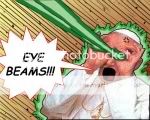Science, Religion & Katrina: A Sober Theist's Point of View

Katrina — Intelligent Design?
from H. Brandt Ayers at The Anniston Star
As Katrina — still mad and furious — howled and spit at the windows of our North Carolina mountain house, I thought how silly and irrelevant was the topic I was writing about.
The randomness of the storm, the lives spared and those taken, the heartbreak of people in the dark crying for help which does not come, this vast human tragedy renders moot arguments between faith and science.
 There will be preachers who will claim to see an intelligent design to the disaster, who in their absurd arrogance will say they know the will of God Almighty, that he sent Katrina to scourge a wicked people.
There will be preachers who will claim to see an intelligent design to the disaster, who in their absurd arrogance will say they know the will of God Almighty, that he sent Katrina to scourge a wicked people.More ministers and congregations, I suspect, will be stricken with humility, as I am, before the awesome, irrational power of nature, and the mystery of God that we are not given to unravel.
For moments, days even, we will all be bound in human concern for the victims of the storm, and be comforted by our oneness. But before long, we will resume our foolish ways.
Looking back, we may see in Katrina grounds for a truce in the preposterous debate over whether God or science is the master of the universe.
We can thank science that allowed us to track the storm on our own TVs, giving us time to prepare and escape. And we can thank God for miraculous rescues, and see His hand at work when a tree fell upon but did not touch a statue of Jesus.
To paraphrase Jesus, he might resolve the contemporary debate by saying, “Give unto science what is scientific, and to God what is His.”
Where is the dividing line to be drawn, and who will draw it? The New York Times quoted the late evolutionary scientist Stephen Jay Gould who fixes the division here:
Science speaks with authority in the realm of “what the universe is made of (fact) and why does it work that way (theory)” and religion holds sway over “questions of ultimate meaning and moral value.”
Another scientist who lives comfortably with faith and science didn’t become a Christian until he was a mature adult. Francis S. Collins directs the National Human Genome Research Institute.
His conversion came while reading the Christian philosopher C.S. Lewis, also a reformed atheist. In his book, Mere Christianity, Lewis argued that ideas of right and wrong are universal among people, a moral law they “did not make, and cannot quite forget even when they try.”
Lewis made Collins wrestle with the origins of conscience and the indescribable joy of pure love. Who put that spark of humanity in us? Not Charles Darwin, he concluded.
Of course, the debate framed today by the title “creationism” or “intelligent design” is just the most recent form of questions that have troubled man for centuries.
The Inquisition imprisoned Galileo until he renounced his theory that the earth circled the sun. His persecutors did allow his daughter, a nun, to visit him — an early form of compassionate conservatism.
In 1929, the philosopher-journalist Walter Lippmann took up the debate in his book A Preface to Morals. He drew the line between science and faith in this passage:
“It is acknowledged that where experiment and observation are possible, the field belongs to the scientists; but…there is a vast field…touching questions like the ultimate destiny of man, the purpose of life, and immortality” which is the realm of faith.
Why can’t we accept such reasonable grounds for truce between the known — the rotation of the planets — and the vast universe, which, the psalmist tells us, celebrate the glory of God?
The very people who put the unformed theory of intelligent design on the public agenda suggest the answer. Two politicians, President Bush and a candidate for president, Sen. Bill Frist, put it there.
This is another example of human folly, a bit of mischief designed to give one sided ownership of the Divine and tars the other side as being godless. As I said, silly and irrelevant.
When a nation’s mind reels, its heart broken by the Gulf tragedy, such petty quarrels have no place.





























0 Comments:
Post a Comment
<< Home